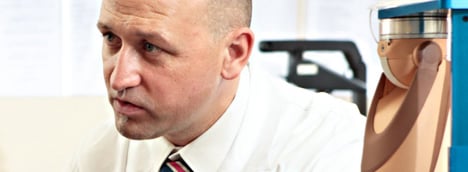The three Austrian beneficiaries of the unprecedented technique had suffered injuries in car and climbing accidents to the "brachial plexus" – a network of nerves running from the spine to the upper limbs.
This type of injury is like a sort of "inner amputation," irreversibly separating the hand from neural signals, said the study published in The Lancet medical journal.
The three patients received their futuristic robot appendages in surgeries between April 2011 and May 2014.
"For the first time since their accidents all three men were able to accomplish various everyday tasks such as picking up a ball, pouring water from a jug, using a key, cutting food with a knife or using two hands to undo buttons," said a statement from The Lancet.
Oskar Aszmann of the Medical University of Vienna, who invented the technique, said it was in some ways less risky than a donor hand transplant, which requires the use of strong immunosuppressant drugs that can cause serious health problems.
'Not flesh and blood'
In the case of a single hand lost, "I think the benefits sway towards the prosthetic reconstruction, because it doesn't have any side-effects and the quality of hand function being restored with the prosthesis is almost as good of that of a hand transplant," the surgeon told AFP.
"Yes, we don't have sensibility (feeling)" with a bionic hand, he conceded. "It is not flesh and blood, it's just plastic and componentry, but if you just look at it from a functional point of view, I think a prosthetic hand today can hold up to a hand transplant."
Cases where both hands are lost, however, are "still the domain of hand transplantation because of the loss of sensibility and the fact that you need to put on a prosthesis with another hand."
The team's major achievement, said the statement, had been to allow neuronal signals to stimulate the robot hand equipped with sensors that respond to electrical impulses in the muscles.
"Existing surgical techniques for such injuries are crude and ineffective and result in poor hand function," said Aszmann.
For their method, the team grafted muscle tissue taken from the thigh to the patients' forearms, and added nerves taken from elsewhere.
Before having their useless hands selectively amputated, the patients underwent nine months of training to activate the grafted muscle, and then learned to use the electrical signals to control a virtual hand.
Once they mastered that, they practised with a prosthetic hand attached with a splint to their non-functioning hand.
The prosthesis costs about €15,000 ($17,000) and the surgery and rehabilitation about the same, said Aszmann.
"Some patients, in the end, will not be candidates for bionic reconstruction, either because there are not sufficient nerves available for reconstruction or they are psychologically not fit for that, or the environment is just not OK," he said.
The technique has since been successfully used in at least one person born without the use of a hand.



 Please whitelist us to continue reading.
Please whitelist us to continue reading.
Member comments